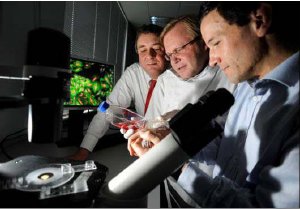Apr 9 2010
TCD scientists based at the Institute of Molecular Medicine (IMM), TCD School of Medicine, in collaboration with CRANN, will lead a pan-European team that has attracted funding worth approximately 12 Million Euros, to develop a cutting edge nanotechnology process which will enable the early and rapid diagnosis of most common cancer types.
 Prof Dermot Kelleher, Head, School of Medicine and IMM Director, Prof Yuri Volkov, IMM and CRANN, and Dr Adriele Prina-Mello, CRANN.
Prof Dermot Kelleher, Head, School of Medicine and IMM Director, Prof Yuri Volkov, IMM and CRANN, and Dr Adriele Prina-Mello, CRANN.
Through European Framework Programme 7 (EU-FP7) funding, the scientists aim to create advanced medical diagnostic devices, enabled by nanotechnology, specifically targeted at the diagnosis and treatment of cancer. The high-specificity of these devices and their potential to provide a large volume of very specific data in a given period for the detection of the diseases will have a radical impact on the next generation of simple, cost effective diagnostic testing in clinical, laboratory and patient care.
Professor Yuri Volkov, the principal investigator in the Institute of Molecular Medicine (IMM) and CRANN, has been awarded the scientific leadership and coordination of a large scale EU-FP7 project in nanomedicine for a four year period. TCD Professors Dermot Kelleher, School of Medicine, John Michael D. Coey, School of Physics and CRANN, and Yurii Gounko, School of Chemistry and CRANN are also collaborators in this project.
Commenting on the significance of this initiative, Professor Dermot Kelleher, Head of School of Medicine and IMM Director, said: “The funding of this EU-FP7 project has several implications as it benchmarks Irish leadership in the cutting edge field of nanomedicine. It clearly demonstrates the power and importance of close interdisciplinary collaboration established between the two leading TCD research institutes, IMM and CRANN. The involvement of UCD research team led by Professor Ken Dawson emphasises the collaboration between TCD and UCD in the Innovation Alliance. The critical importance of the research programme is that it brings 21st century experience and know-how in nanotechnology to bear on some of the most important questions in human medicine relating to diagnosis and treatment of cancer. IMM is strategically positioned on the premises of St. James’s Hospital campus and we are looking forward to the time when our patients here will benefit from these innovative technologies”.
Professor John Boland, Director of CRANN said: “Ireland is now globally recognised for its expertise in the area of nanoscience, as evidenced by the large amounts of non-exchequer funding we are winning through competitive international research projects. Research is a global competition and we need to continue to develop our knowledge base and expertise to make Ireland a true Innovation Centre.”
Dr Adriele Prina-Mello, Deputy Coordinator of the EU-FP7 programme and CRANN senior researcher explained that “the nature of this European funding is a well balanced academia/industry project which includes 22 European partners from nine EU countries. Ireland will be strategically placed as project coordinator, and key innovator partner in clinical diagnostic devices at both academic and industrial level”.
Dr Sergio Fernandez-Ceballos, Enterprise Ireland and the Irish National Contact Point for this area of FP7, commented that “this project won the largest amount of funding for Ireland from the EU Nanotechnology Programme to date and it also has the highest number of partners from an Irish led consortium. This is a significant achievement for the Irish nanotechnology research sector and demonstrates how Ireland can compete in the international research arena”.
In welcoming the announcement Barry O’Leary, CEO IDA Ireland congratulated all the participants noting that “This is a significant vote of confidence in the Irish innovation and research eco-system which will help increase the attractiveness of Ireland as an investment location.”